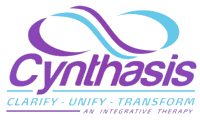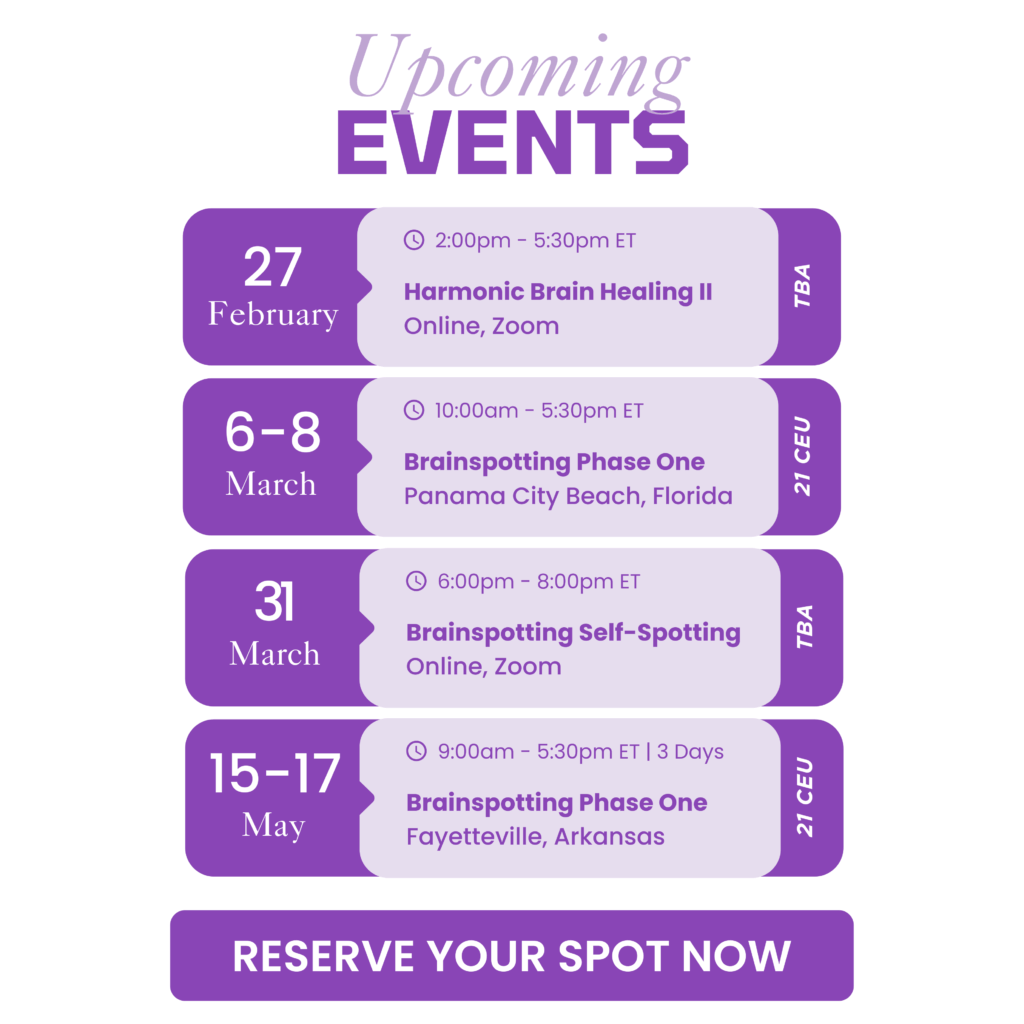Bibliography
Borelli, J. L., Sohn, L., Wang, B. A., Hong, K., DeCoste, C., & Suchman, N. E. (2019). Therapist–client language matching: Initial promise as a measure of therapist–client relationship quality. Psychoanalytic Psychology, 36(1), 9–18. https://doi.org/10.1037/pap0000177
Caria, A. (2020). Mesocorticolimbic Interactions Mediate fMRI-Guided Regulation of Self-Generated Affective States. Brain Sciences, 10(4), 223. http://dx.doi.org/10.3390/brainsci10040223
Cloitre, M., Courtois, C.A., Charuvastra, A., Carapezza, R., Stolbach, B.C. & Green, B.L. (2011). Treatment of complex PTSD: Results of the ISTSS expert clinician survey on best practices. Journal of Traumatic Stress, 24, 615-627. https://doi.org/10.1002/jts.20697
Corrigan, F. & Grand, D. (2013). Brainspotting: Recruiting the midbrain for accessing and healing sensorimotor memories of traumatic activation. Medical Hypotheses, 80, 759-766. https://doi.org/10.1016/j.mehy.2013.03.005
Corrigan, F., Grand, D., & Raju, R. (2015). Brainspotting: Sustained attention, spinothalamic tracts, thalamocortical processing, and the healing of adaptive orientation truncated by traumatic experience. Medical Hypotheses, 84, 384-394. https://doi.org/10.1016/j.mehy.2015.01.028
Corrigan, F., & Hull, A. (2015). Neglect of the complex: Why psychotherapy for post-traumatic clinical presentations is often ineffective. BJPsych Bulletin, 39(2), 86-89. https://doi.org/10.1192/pb.bp.114.046995
Courtois, C. A., & Brown, L. S. (2019). Guideline orthodoxy and resulting limitations of the American Psychological Association’s Clinical Practice Guideline for the Treatment of PTSD in Adults. Psychotherapy, 56(3), 329-339. http://dx.doi.org/10.1037/pst0000239
Flückiger, C., Del Re, A. C., Wampold, B. E., & Horvath, A. O. (2018). The alliance in adult psychotherapy: A meta-analytic synthesis. Psychotherapy, 55(4), 316-340. http://dx.doi.org/10.1037/pst0000172
Harricharan, S., Nicholson, A. A., Thome, J., Densmore, M., McKinnon, M. C., Théberge, J., Frewen, P. A., Neufeld, R. W. J., & Lanius, R. A. (2020). PTSD and its dissociative subtype through the lens of the insula: Anterior and posterior insula resting‐state functional connectivity and its predictive validity using machine learning. Psychophysiology, 57(1). https://doi.org/10.1111/psyp.13472
Håvås, E., Svartberg, M., & Ulvenes, P. (2015). Attuning to the unspoken: The relationship between therapist nonverbal attunement and attachment security in adult psychotherapy. Psychoanalytic Psychology, 32(2), 235–254. https://doi.org/10.1037/a0038517
Hildebrand, A., Grand, D., & Stemmler, M. (2017). Brainspotting – the efficacy of a new therapy approach for the treatment of Posttraumatic Stress Disorder in comparison to Eye Movement Desensitization and Reprocessing. Mediterranean Journal of Clinical Psychology, 5(1). Retrieved from https://cab.unime.it/journals/index.php/MJCP/article/view/1376/pdf_2.
International Brainspotting Association. (2014). Code of ethics and standards of Professional Practice. Retrieved from https://brainspotting.com/wp-content/uploads/2017/06/Code-of-Ethics-And-Standards-of-Professional-Practice.pdf
Kashihara, K. (2020). Microsaccadic modulation evoked by emotional events. Journal of Physiological Anthropology, 39 (26). https://doi.org/10.1186/s40101-020-00238-6
Masson, J., Bernoussi, A, & Moukouta, C.S. (2017). Brainspotting therapy: About a Bataclan victim. Global Journal of Health Science, 9(7). Retrieved from https://doi.org/10.5539/gjhs.v9n7p103.
Mulckhuyse, M. (2018). The influence of emotional stimuli on the oculomotor system: A review of the literature. Cognitive, Affective, & Behavioral Neuroscience, 18, 411–425. https://doi.org/10.3758/s13415-018-0590-8
Nakamura, H. A., Tawatsuji, Y. B., Siyuan Fang, S. B., & Matsui, T. (2021). Explanation of emotion regulation mechanism of mindfulness using a brain function model. Neural Networks, 138, 198-214. https://doi.org/10.1016/j.neunet.2021.01.029
Nakano, T., Kato, M., Morito, Y., Itoi, S., & Kitazawa, S. (2013). Blink-related momentary activation of the default mode network while viewing videos. PNAS, 110 (2) 702-706 https://doi.org/10.1073/pnas.1214804110
Nicholson, A. A., Friston, K. J., Zeidman, P., Harricharan, S., McKinnon, M. C., Densmore, M., Neufeld, R. W., Théberge J, Corrigan, F., Jetly, R., Spiegel D., & Lanius, R. A. (2017). Dynamic causal modeling in PTSD and its dissociative subtype: Bottom-up versus top-down processing within fear and emotion regulation circuitry. Human Brain Mapping, 38(11), 5551-5561. https://doi.org/10.1073/pnas.1214804110
Rocco, D., Gennaro, A., Salvatore, S., Stoycheva, V., & Bucci , W. (2017) Clinical mutual attunement and the development of therapeutic process: A preliminary study. Journal of Constructivist Psychology, 30(4), 371-387. https://doi.org/10.1080/10720537.2016.1227950
Siegel, Daniel J. (2019). The mind in psychotherapy: An interpersonal neurobiology framework for understanding and cultivating mental health. Psychology and Psychotherapy: Theory, Research and Practice, 92, 224-237. https://doi.org/10.1111/papt.12228
Snyder, J. & Silberschatz, G. (2017) The Patient’s Experience of Attunement and Responsiveness Scale. Psychotherapy Research, 27(5), 608-619. https://doi.org/10.1080/10503307.2016.1147658
Zaki, J., Davis, J. I., & Ochsner, K. N. (2012). Overlapping activity in anterior insula during interoception and emotional experience. NeuroImage, 62(1), 493-499. https://doi.org/10.1016/j.neuroimage.2012.05.012


